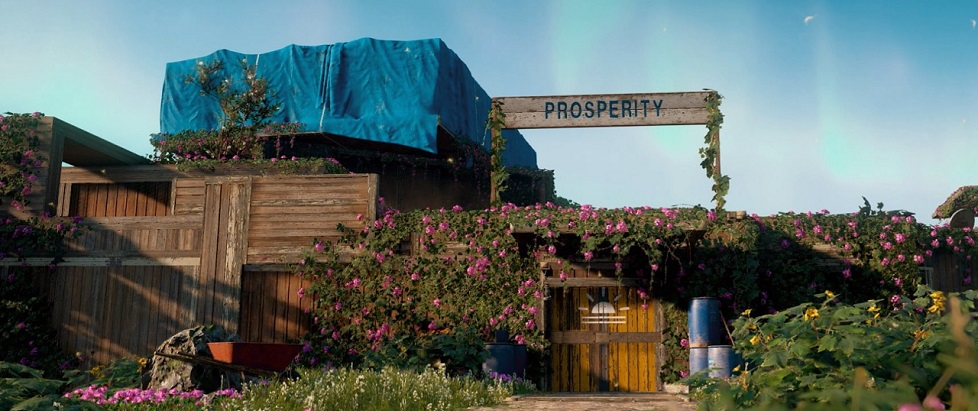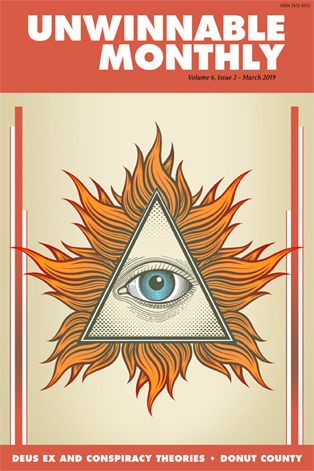
Whose Apocalypse?
 This column is a reprint from Unwinnable Monthly #113. If you like what you see, grab the magazine for less than ten dollars, or subscribe and get all future magazines for half price.
This column is a reprint from Unwinnable Monthly #113. If you like what you see, grab the magazine for less than ten dollars, or subscribe and get all future magazines for half price.
———
Revisiting stories, old and new
———
It was with a great deal of diversion and no small amusement that I spent a couple dozen hours in recent weeks fortifying a small encampment in Far Cry New Dawn, crafting vehicles and weapons out of scrap metal and spare parts, raiding supplies stashed by fictional people obsessed with preparing for an apocalypse that had come and gone without them and even creating a small garden of medicinal plants and never once that I can recall did I spend even a minute acquiring, planting, tending, or harvesting a single morsel of food.
Emily St. John Mandel’s fine post-apocalyptic novel Station Eleven describes the end of motorized transportation in her characters’ lifetime as the result not of cascading mechanical failures but of old fuel becoming unusable. Those who envision a Mad Max future of small groups fighting for decades over dwindling petroleum supplies will be disappointed to learn that Mandel places this date as two years from the destruction of the refining and distribution industries. Biofuels (plant oils) may extend the usefulness of diesel vehicles, but there will be no fortified tankers, no ship in the middle of the ocean supporting Dennis Hopper’s crew of parasites and pirates.
Which is to say that I was probably wasting my time in Hope County scavenging ethanol. Scurvy is more likely to be a pressing concern than gassing up the pickup.
It is, of course, not entirely fair to ask a videogame or any other mass entertainment media to base itself on an entirely reasonable or plausible vision of a post-collapse society. Such a thing is not likely to be especially entertaining. All the same, I marvel a bit at our appetite for particular versions of such worlds. We know exactly what life looks like when social structures collapse. We know exactly what sort of suffering that entails, and what social organizations have established themselves in the aftermath.
We know that even if we now misleadingly call the period the Dark Ages, most of Europe didn’t miss Rome.
There is a certain comfort in this, but a warning as well. We will survive, fairly certainly, and we may even be reasonably happy. There is research that suggests that hunter-gatherer societies are happier and have more leisure time than agricultural societies. We are not our cities. The most likely scenarios are that the world will end, and then it will go on.
On the other hand, there is effectively nothing we as individuals can do to prepare. Two years of shelf stable rations are not a solution to the problem of the grocery store never opening again. A rifle and a bunker can protect a shelf of canned goods but not livestock or a field of crops. I don’t really understand why the twins felt the need to launch an assault on the Prosperity settlement when they could have set up a siege and starved us out in a week. My explosive lab may have been fully upgraded, but it wasn’t going to feed a single person.
No matter how hard Clementine looks, there will eventually be no more cans.
Everything is always ending, but some endings are better than others, and some endings are much more final.
[pullquote]Everything is always ending, but some endings are better than others, and some endings are much more final.[/pullquote]
Every world ends. Every society ends. Our grandparents at our age would have been mystified by the world we inhabit. It is increasingly difficult to read Shakespeare without assistance or a great deal of acclimation, and nearly impossible to read Chaucer. I sometimes struggle to recognize my sense of myself and the world from a decade ago, much less two.
None of these things constitute an apocalypse. None of them can even be rightly considered unfortunate. I cannot drive or keep a horse. My children may not drive or maintain internal combustion engines.
It is much more likely that they will rely on someone else to raise and grow the food that they consume, as do I.
We are all in this together. We cannot save ourselves no matter how much we prepare, but we might be able to save each other.
———
Gavin Craig is a writer and critic who lives outside of Washington, D.C.




